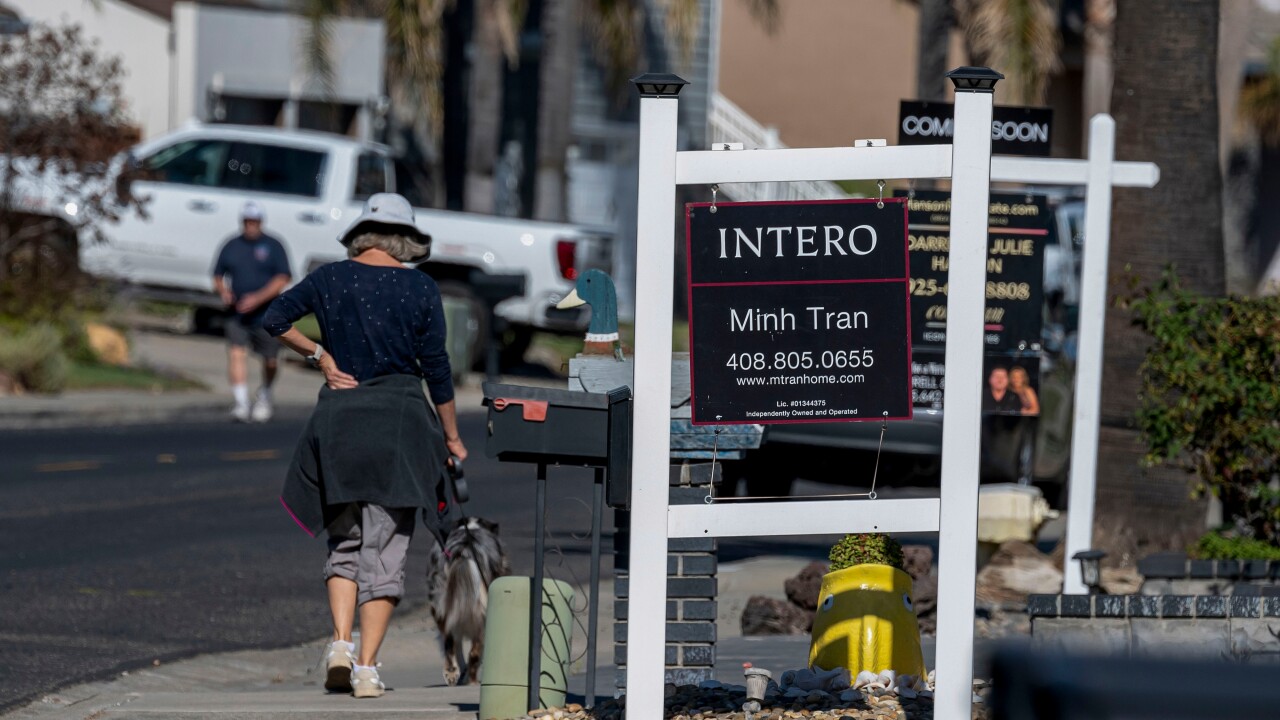The battle over the future of housing finance may turn on whether whatever reforms or replaces Fannie Mae and Freddie Mac will bypass small banks, delivering more market share and power to the biggest banks.
Small banks are clearly concerned, and are pushing back against the idea — conventional wisdom to many lawmakers of both parties on Capitol Hill — that significant changes are needed. The Independent Community Bankers of America and the Community Mortgage Lenders of America have signaled they support plans that favor minor reform over a massive restructuring of the system.
"ICBA is very worried that the community banks and small mortgage issuers will be left out of any GSE and housing policy bill that comes out of the Senate," said Cam Fine, president of the ICBA. "The bills that we see so far will disadvantage nearly all community banks and will greatly favor the Wells Fargo class of banks."

But lawmakers are attempting to forestall such talk, arguing that their efforts will result in an equitable system that doesn't hurt smaller players.
"There's a misunderstanding that something being designed tilts toward larger institutions," said Sen. Bob Corker, R-Tenn., during a hearing in the Senate Banking Committee last week. "I think we've learned that the existing infrastructure we have in place is something we need to build off of."
Corker, Chairman Mike Crapo, R-Idaho, and Sen. Mark Warner, D-Va., are working on a plan that would replace Fannie and Freddie with private sector entities backed by a catastrophic guarantee from the government. The exact details of that proposal have yet to be worked out, but a similar piece of legislation stalled in 2013, in part over worries it did not sufficiently protect small lenders.
For now, small-bank advocates are favoring a different plan, one floated by hedge funds that would recapitalize and reform Fannie and Freddie. That would deliver big profits to hedge funds that bought up shares of the government-sponsored enterprises after they went into conservatorship, but it would preserve a system that many smaller institutions were comfortable with.
At issue is whether under the Corker-Crapo-Warner plan, big banks would effectively control the secondary market if they are allowed to issue new securities with an explicit government guarantee.
"This is another attempt to deliver the entire mortgage market to the 'too big to fail' banks and Wall Street," Glen Corso, the executive director of the Community Mortgage Lenders of America, said of Senate efforts.
Rob Zimmer, head of external affairs at the mortgage lender group and a former lobbyist for Freddie, said the Senate plan would help banks free up risk-weighted capital.
"If the government guarantees the mortgage securities, banks' private risk-weighted capital goes from 20% to zero, freeing up an enormous amount of money for the largest banks," Zimmer said. "The liquidity coverage ratio would go from 15% to zero, so banks could take on more leverage as well."
But the Mortgage Bankers Association is pushing its own plan, one that could be adopted by lawmakers, that envisions a total of four or five private companies, so-called guarantors, to compete against Fannie and Freddie. Potential guarantors include pension funds, insurance funds, mortgage insurance companies and private equity firms that do not operate mortgage lenders.
To keep the largest mortgage originators like Wells Fargo or Quicken Loans from dominating the secondary market, the plan would allow lenders to own no more than a 9.9% interest in a guarantor. The guarantors, including a revamped Fannie and Freddie, would operate as stand-alone companies similar to utilities.
"To say that we created something to allow larger lenders to control or own a guarantor is flat-out not true," said Pete Mills, the MBA's senior vice president of residential policy and member engagement.
But Zimmer is skeptical that will work, arguing that banks could band together and control the market through their own guarantors.
Would big banks be "OK with Fannie buying 10% of an origination platform?" he asked.
David Stevens, the head of the MBA, said it's the hedge funds' plan that would hurt small banks. He said hedge funds, which bought Fannie and Freddie stock on the cheap, are hoping for a windfall if the GSEs are taken out of conservatorship.
"We shouldn't be chasing the interests of investors who bought the stock at pennies on the dollar," said Stevens, a former commissioner of the Federal Housing Administration, who also has led Freddie's single-family business.
"Recap and release would mean the GSEs have an implicit [not an explicit] guarantee," Stevens said, "and mortgage-backed securities prices would drop and [interest] rates would rise."
From 1998 to 2010, in the run-up to the mortgage crisis, the market share of the top 10 banks jumped to 80% from 40% largely because of special deals that the GSEs made with the largest lenders, Stevens said.
"If you want to keep rates low and protect lenders large and small, why would you want to recap the GSEs?" asked Stevens. "None of that would be to the advantage of small community banks and independent mortgage bankers."
Both the hedge funds and MBA's plans would create a system in which private capital takes losses ahead of a backstop by taxpayers, but there remains divergence on which platform should be used to issue securities. Ed DeMarco, the former acting director of the Federal Housing Finance Agency, said that policymakers should expand on the existing Ginnie Mae platform.
But the FHFA has already created a common securitization platform for Fannie and Freddie, which many see as the backbone of any new housing finance system. Past attempts at GSE reform suggested that the common securitization platform could be sold off as a private company with its board of directors made up of industry participants.
The impetus to get GSE reform passed soon is Fannie and Freddie's declining capital levels. The Treasury Department and the FHFA struck a deal in 2011 that all profits from the two GSEs should be delivered to the U.S. government. That has kept Fannie and Freddie from rebuilding capital, and Mel Watt, the FHFA's director, fears that they may soon be forced to use a line of credit with Treasury. That's something he would like to avoid, worrying it could disrupt the market.
There is another deadline looming. Watt's term expires in January 2019, and whether to recapitalize Fannie and Freddie could fall to a new director appointed by President Trump unless Congress acts soon.





